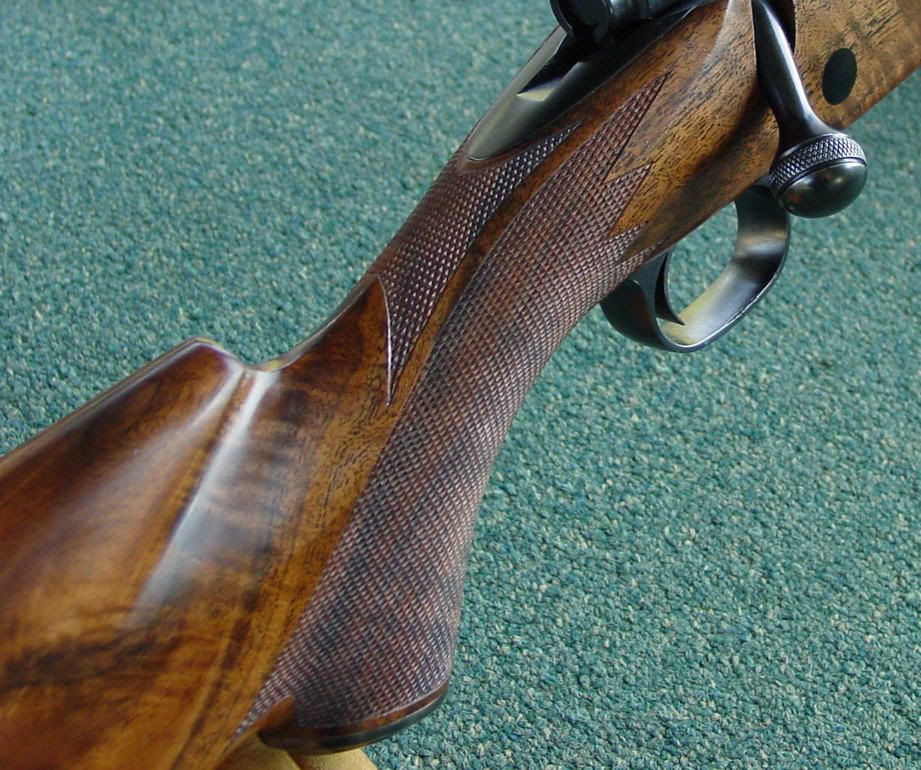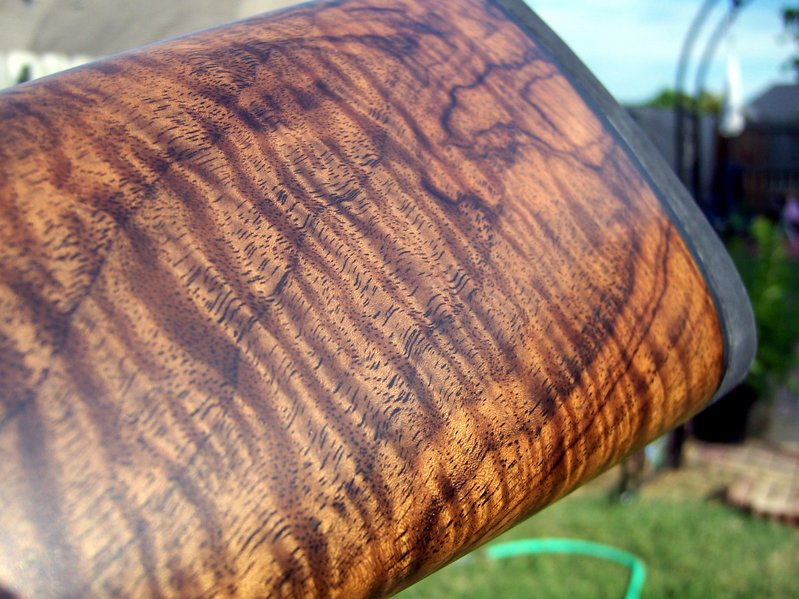

 The Accurate Reloading Forums
The Accurate Reloading Forums  THE ACCURATE RELOADING.COM FORUMS
THE ACCURATE RELOADING.COM FORUMS  Guns, Politics, Gunsmithing & Reloading
Guns, Politics, Gunsmithing & Reloading  Gunsmithing
Gunsmithing  Stock filler?
Stock filler?Go  | New  | Find  | Notify  | Tools  | Reply  |  |
| one of us |
What's your favorite stock filler & why?  Doug Humbarger NRA Life member Tonkin Gulf Yacht Club 72'73. Yankee Station Try to look unimportant. Your enemy might be low on ammo. | ||
|
| One of Us |
I have only used dembart from midway and it worked fine...otherwise it's sand-sand-sand with velvit oil. ________________________________________________ Maker of The Frankenstud Sling Keeper Proudly made in the USA Acepting all forms of payment | |||
|
One of Us |
For sound deadening, I like the spray foam Home Depot sales. It beats the crap out of wadded news paper. You were talking about composites weren't you? _______________________________________________________________________________ This is my rifle, there are many like it but this one is mine. My rifle is my best friend, it is my life. | |||
|
| one of us |
No. You marines are all alike!  Doug Humbarger NRA Life member Tonkin Gulf Yacht Club 72'73. Yankee Station Try to look unimportant. Your enemy might be low on ammo. | |||
|
| One of Us |
Wet sanding starting around 320 grit, and then through all the grits. | |||
|
| One of Us |
powdered bone black mixed with tung oil (or whatever finish I'm using on a particular stock.) Good hunting, Andy ----------------------------- Thomas Jefferson: “To compel a man to furnish funds for the propagation of ideas he disbelieves and abhors is sinful and tyrannical.” | |||
|
| one of us |
Another way to fill the grain is to use a spray finish like Gun Sav'r. This method works best if the grain is tight and sanding is taken to 1000 grit or so. Following the directions, spray on lots of coats--maybe 4 or 5 (High Gloss fills grain better)--and then using 400 grit paper sand the finish flat. You can then spray on another coat to get the sheen back then see if your grain is filled; you can use the satin finish now if you want that. If the grain still shows add more coats until it doesn't. The advantage of this method is it can save sanding time which I think is sort of like time in purgatory. I don't do all stock this way but I use it sometimes. John Farner If you haven't, please join the NRA! | |||
|
| One of Us |
Intersting, John...how do you handle the inevitible build up in the inletting when using a spray finish? | |||
|
| One of Us |
We mask the areas that are inletted. There really isn't much buildup when the stock is sanded to 1000 grit and the grain is tight. Also note that John says "lots of coats", but maybe "lots of THIN coats" is more accurate. | |||
|
| one of us |
Duane, I'm glad you asked as I wasn't clear in my post. As my brother said, masking off inletting is important so you don't get any build up in the inletting, and final hand polishing also is important. I seal the entire stock with SeaFin marine wood sealer prior to masking and spraying, much the same as you use it on your stocks. After spraying the stock I use either 4F pumice for a satin finish or rotten stone for glossy. I mix a little paraffin oil with the abrasives and using a soft cloth buff the entire stock after removing the masking. John Farner If you haven't, please join the NRA! | |||
|
| one of us |
I like using the method I got from Sterling Davenport. Basically you wetsand with tung oil and 320 wet/dry and let it build up a "mud coat" and let it dry for a week. Mudcoat sand with the next higher grade of paper and let it dry for a week. After just 2 or 3 coats the sanding dust and oil will have filled the pores and you can wetsand again with 600grit and wipe back the excess with the pores filled. It won't work if you don't let the tung oil dry hard, give it at least a week. It's an easy finish to repair scratches on, just lightly wetsand with the final grit you used. If you like a little gloss you can rub in a final coat of LinSpeed. It's also a better finish to checker since it doesn't have hard silicates that can dull your checkering tools. The whole process is in a book called "RifleSmithing". It's a green softcover book that you can often find at Borders or Barnes and Noble, Sorry but I forget the authors name. My stuff isn't in the same league as Mr. Weibe's but I think the finish process gave me good results with moderate skills and effort:   Doug, recognize the nifty sling swivels on the 2nd one?...............................DJ ....Remember that this is all supposed to be for fun!.................. | |||
|
| one of us |
Getting a lot of excellent info guys. Much appreciated.  Doug Humbarger NRA Life member Tonkin Gulf Yacht Club 72'73. Yankee Station Try to look unimportant. Your enemy might be low on ammo. | |||
|
| One of Us |
Probably the best method is the one described by djpaintles. If you're in a bit more of a hurry though the African Express filler does a very good job especially on English walnut. Also I like to use a 50/50 mixture of Tung Oil and spar varnish applied like djpaintles describes. Its a thin mixture that penetrates well and dries in about a day versus a week for pure tung oil. "Peace is that brief glorious moment in history when everybody stands around reloading". | |||
|
| One of Us |
DJ - that is a fine looking checkering job | |||
|
| one of us |
I do it the way DJ does, except I use Formby's Tung Oil Finish. Like the Deft, it has the tung oil but also some polyu in it. Since you can get it in satin or gloss, you can make the choice up front. Larry "Peace is that brief glorious moment in history, when everybody stands around reloading" -- Thomas Jefferson | |||
|
| one of us |
I forgot to mention a step that I started using on the 2nd rifle pictured but not the first. I've started sealing the stock after sanding with a Clear Penetrating Epoxy Sealer or CPES. This is the stuff I've been using: http://www.thejapanwoodworker.com/product.asp?s=JapanWo...56.102&dept_id=13246 It cuts down on the number of coats that you need to sand in and gives much better vapor and water protection than Tung Oil Finish alone would. Also I usually just use Homer Formby's Tung Oil Finish also, it sucks if you forget to add dryer to straight Tung Oil and you don't need to with Formby's. Another little trick to keep the Oil from jelling is to hold your breath as long as is comfortable and exhale it into the Tung Oil container just before sealing the cap. The CO2 in your breath displaces some of the oxygen and makes the Oil last far longer without jelling......................DJ ....Remember that this is all supposed to be for fun!.................. | |||
|
| One of Us |
.....Tha is a new one to me...thanks much..Duane | |||
|
| one of us |
When Dale Goens thought the stock wood might be a little too soft to checker well, he's start finishing the stock by sealing it sometimes like this: He'd squeeze out two-inch strips of 5-minute epoxy on a card, then scrape it into a small jar, add acetone and mix it up. He'd then paint that onto the stock where it would soak in and harden. Seems like a similar technique to using the CPES. John Farner If you haven't, please join the NRA! | |||
|
| one of us |
Somewhat similar except that the CPES is very thin and soaks into the wood. The theory behind it is to get a water barrier that dries by catalyzation rather than evaporation. I need to hunt with the 9,3 in more different climates to see how well the CPES seals wood but so far it seems to be doing a good job. Steve, I hope all is well with you and yours. Is your new book available now? And if so where might I purchase a copy? ............................DJ ....Remember that this is all supposed to be for fun!.................. | |||
|
| One of Us |
SDH....very nice work. Does water wet sanding raise the grain? Cause any discoloration...on certain walnuts, especially american black walnut the natural oils tend to be drawn to the surface and darkening the wood when water wiskering or wet sanding. I have seen walnut steamed during finishing to bring the natural oils to the surface to darken a light color stock. What product are you using for a stain? Thanks, Ron | |||
|
| one of us |
Duane what is the working time with this stuff?  Doug Humbarger NRA Life member Tonkin Gulf Yacht Club 72'73. Yankee Station Try to look unimportant. Your enemy might be low on ammo. | |||
|
| one of us |
Doug, You've got 20 minutes or so to brush it in. It cures IIRC in 4-5 hours but I usually just leave it overnight..................DJ ....Remember that this is all supposed to be for fun!.................. | |||
|
one of us |
I seal the stock with sealer and let it dry. Then I mix 3 parts Rottenstone with 1 part Boneblack. I mix it all up into a mud using the stock finish. I'll rub about 3 coats into the pours letting each coat dry. After that I wet sand with 300 grit paper and repeat as necessary until I feel like I get the pours filled. After that I'll wet sand with 500 grit and call the pours filled. After that I either seal or stain. I really like the black pours. Terry  -------------------------------------------- Well, other than that Mrs. Lincoln, how was the play? | |||
|
| Powered by Social Strata |
| Please Wait. Your request is being processed... |
|

Visit our on-line store for AR Memorabilia

